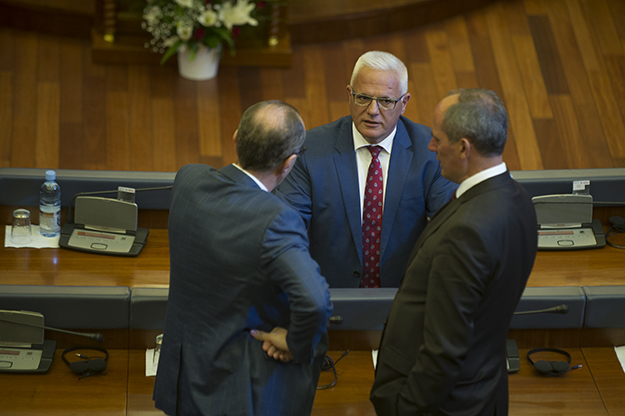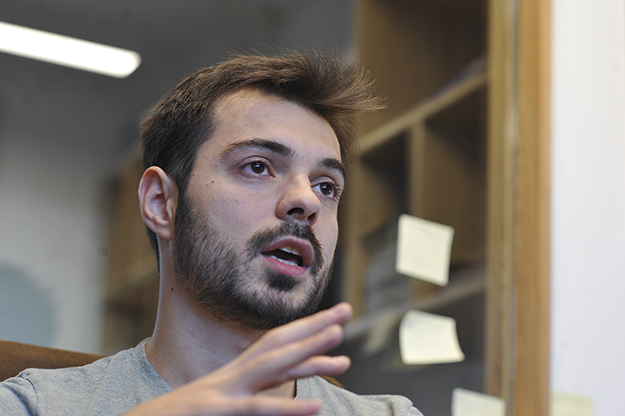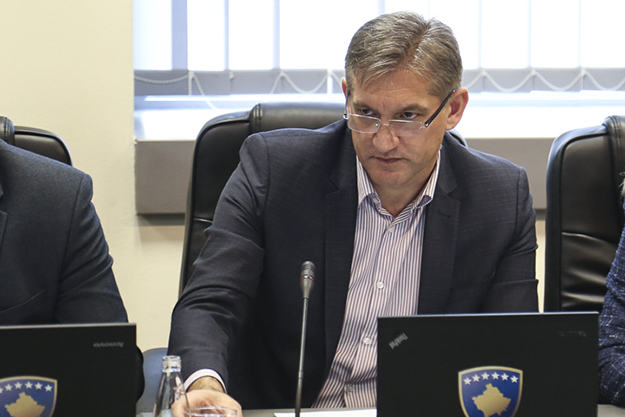Back in 2011, a former Democratic Party of Kosovo (PDK) deputy was hoping to find a job in one of the public institutions. Then, one day, Bahri Hyseni received a phone call from a close friend who told him that the party had helped to secure him a lucrative job in the energy transmission public enterprise, KOSST.
But the friend had made a mistake. Hyseni, who is now a prosecutor, had never heard of this public enterprise before in his life, and clearly had no idea what he would be doing there. ‘I didn’t apply!’ he said. His friend, Adem Grabovci, then head of the PDK parliamentary group, had mixed up his Bahri Hysenis, and apparently thrown his weight behind a non-party man by mistake.
Today, Grabovci is one of 11 people facing prosecution for his role in the so-called ‘Pronto’ affair, which was revealed in 2016 when online media Insajderi published a series of leaked wiretapped phone conversations from 2011. The conversations revealed extensive efforts to place party officials in public institutions, apparently coordinated by figures such as Grabovci who were at the very heart of PDK.

Adem Grabovci, former head of the PDK parliamentary party, was indicted earlier this year for his role in the so-called ‘Pronto’ affair. Photo: Atdhe Mulla / K2.0.
Kosovo’s Prosecution Office filed the indictment for the ‘Pronto’ affair in April this year, and the initial court session was set to begin on October 1. But the judge was forced to postpone the date to November 15 because seven of the 11 defendants failed to appear in court.
Such delays have become characteristic of Kosovo’s justice system, which has long been criticized for inefficiency and backlogs. But these issues are particularly noticeable in the considerable number of high profile cases involving senior state officials.
Currently, a total of six government ministers are facing criminal indictments from Kosovo’s Prosecution, as well as numerous elected politicians, including Assembly deputies and municipal mayors. Many of these cases have been dragging on for years.
Genc Nimoni, a researcher at anti-corruption organization Çohu, believes that prosecutors have no will, and have professional deficiencies when it comes to effectively dealing with big cases that are related to politics.
As for the ‘Pronto’ case, he believes the indictment is weak in regard to the alleged crimes included.
“There was a suspicion of corruption and organized crime, but the Prosecution only used the penal offence of ‘Violating the equal status of citizens and residents of the Republic of Kosovo,’” says Nimoni, adding that the number of defendants could also have been bigger, since the published wiretapped conversations incriminate more than 11 people.
Përparim Kryeziu, a researcher at the Legal and Political Studies Group, also expresses concern about the way in which high level cases are being dealt with in Kosovo. According to Kryeziu, the ‘Pronto’ case has proven beyond doubt that Kosovo is a state with no rule of law.
“Our organization finds it concerning how these cases are arrogantly neglected and how the Chief State Prosecutor confidently goes on public television to say that he acknowledged the points that Minister Beqaj made to him during the time in which his case was being proceeded,” Kryeziu says.
In a television interview in August shortly after the ‘Pronto’ indictment had been filed, Chief State Prosecutor Aleksandër Lumezi spoke casually of having discussed the case with Minister of Innovation Besim Beqaj, one of the accused. For Kryeziu, the fact that a minister discussed an ongoing criminal case — let alone one in which he is a co-accused — with the chief state prosecutor shows the power that public officials have outside their offices.
The researcher believes that appropriate respect is not being shown toward courts, illustrating this with the fact that the first session of the ‘Pronto’ case failed because some of the defendants didn’t appear in court. “There are no consequences if you do not respond to the court,” he says.

Përparim Kryeziu, a researcher at the Legal and Political Studies Group, believes that the ‘Pronto’ affair has demonstrated that Kosovo effectively has no rule of law. Photo: Atdhe Mulla / K2.0.
Kryeziu also points to the indictment against former PDK deputy Azem Syla as another case that shows the justice system’s impotence in dealing with cases that are linked to politics.
Syla, alongside 21 other people, is accused of organized crime in the case known as ‘Toka.’ According to the indictment, Syla was involved with an organized criminal group that committed a series of criminal acts, including document forgery and fraud related to state-owned land in different locations around Prishtina.
These alleged offences were committed in 2006, but the indictment wasn’t filed until October 2016. Since then, the court has faced different obstacles — from a missing judge and judicial strikes to Syla claiming to have health problems — and has not managed to conclude the trial. Since January this year, the court has set dates for eight different sessions, attempting to progress with judicial proceedings. However, the majority have failed to take place; the next session is set to begin on November 16.
Amidst the many failures to hold trial sessions, in February this year it was announced that the ‘Toka’ case would be transferred from the EU Mission in Kosovo (EULEX) prosecutors and judges — who have been responsible for organized crime cases since 2008 — to local authorities as part of the gradual handover of Kosovo’s institutions. The decision was heavily opposed by the EULEX prosecutor who had filed the indictment, Danilo Ceccarelli.
“It is an unjust decision. No-one besides the head of the EULEX Judges can make this decision,” Ceccarelli stated at the time. “Transferring the case to local [institutions] means ending the case, and we know why. There was sufficient time for the mission to conclude the case, because there were 50 scheduled sessions … There is no responsibility or accountability.”
Meanwhile, the Basic Court of Prishtina released Syla from house arrest on August 24 this year following the retirement of Prosecutor Abdurrahim Islami, who had been handling the case; Islami described the court’s decision as “strange,” saying that it went against usual practice. Syla had been held in custody until March, before the Basic Court had decided to release him; however, after 11 days the court subsequently decided he should be detained under house arrest.
Ministers in the dock
The current government has more than its fair share of ministers facing legal issues. Besides Minister of Innovation Besim Beqaj being included in the ‘Pronto’ indictment, five other ministers in Prime Minister Ramush Haradinaj’s cabinet also face legal issues.
Deputy Prime Minister and Minister for the Diaspora Dardan Gashi is accused of unauthorized gun possession, Minister of Infrastructure Pal Lekaj is accused in a case of misuse of public office dating back to his time as mayor of Gjakova, and Minister of the Kosovo Security Force Rrustem Berisha is one of 12 people accused of manipulating the list of Kosovo Liberation Army (KLA) veterans while part of the government’s verification commission.
A case against Minister of Economic Development Valdrin Lluka is being processed by the Appeals Court, after the Basic Court found him not guilty of charges relating to conflict of interest during his time as Head of the Investment Promotion Agency.

Minister of Innovation Besim Beqaj is one of six ministers in Ramush Haradinaj’s government currently facing criminal charges. Photo: Atdhe Mulla / K2.0.
Lately, despite calls to exclude indicted people from the executive branch, the government appointed Endrit Shala as Minister of Trade and Industry. Shala is also included in the same ‘unauthorised possession or control of weapons’ indictment as Deputy Prime Minister Dardan Gashi, as is Sami Lushtaku, the former mayor of Skenderaj.
The indictment was filed after the media published a video in which a number of politicians are seen firing guns in a room in the Malishevë home of Deputy Prime Minister Fatmir Limaj. The Basic Court of Gjakova told K2.0 that this case is not currently being prioritized due to the high number of cases that they are handling.
Çohu believes that the big cases are not being taken seriously by the justice system and that prosecutors are not doing enough, which is causing many high profile cases to fail in the initial stages. Nimoni illustrates this with four “emblematic” cases.
Mayor of Gjilan Lutfi Haziri, Mayor of Mitrovica Agim Bahtiri, and former Minister of Education Ramë Buja all previously faced charges of misuse of public office — all three cases were dismissed by the courts. Nimoni says that in all of these instances, as with the recent case against former Head of the Appeals Court Sali Mekaj, the failure to secure a successful prosecution lies with deficiencies in the Prosecution.
Mekaj was indicted for misuse of public office in May 2016 for allegedly negotiating a bribe to release a person detained for inciting murder, and for mediating a usury case involving his nephew. However, 18 months after the opening of the trial, which was largely held behind closed doors, in May this year the Basic Court of Prishtina dismissed the case.

Genc Nimoni, a researcher at Çohu, believes that high profile cases are not being taken seriously by the justice system and that prosecutors are not doing enough. Photo: Atdhe Mulla / K2.0.
According to Nimoni, the weakness of the judicial system doesn’t only rest with weak indictments.
In a report published last year, in which Nimoni analysed big cases in three of Kosovo’s Basic Courts, another issue is highlighted: The courts giving minimal sentences to convicted criminals in high profile cases.
Of 13 monitored cases that were classified as high level, eight were concluded in the first or second instance court, but the report highlights that in four cases the defendants were sentenced to minimal punishments, whereas in four other cases the Prosecution failed to prove the crimes alleged in their indictments due to a lack of evidence.
Kryeziu says that the work of the justice system is also measured through public perception, which is created mainly as a result of performances in cases in which the accused are people who are known to the public, including politicians. He says that through a research study, his organization found that around 70 percent of Kosovo citizens believe that the justice system is influenced by politics and that citizens are not equal before law.
Making the case for visa liberalisation
External focus on Kosovo’s justice system intensified in 2016 after the European Commission directly made its improvement a specific prerequisite of Kosovars traveling visa free in Europe’s Schengen Zone.
Specific conditions relating to tackling corruption had been included in Kosovo’s so-called Visa Liberalisation Roadmap from the European Commission in 2012. But the judiciary’s record came under particular scrutiny after the Commission announced in May 2016 that despite Kosovo having fulfilled all of its specific obligations, two additional stipulations had been added; while the requirement to demarcate its border with Montenegro grabbed all the headlines, amongst extensive protests led by opposition parties, Kosovo was also told to prove it had ‘strengthened its track record in the fight against organised crime and corruption.’
In 2015, as part of efforts to fulfill the Visa Liberalisation Roadmap criteria, a cross-sectional team was formed with representatives from institutions including Kosovo Police, Customs, and Prosecution to agree which cases to target when it comes to organized crime and corruption.
A spokesperson from the Office of the Chief Prosecutor of the Special Prosecution of Kosovo, Reshat Millaku — the special prosecutor responsible for coordinating the ‘unity’ team — told K2.0 that since 2015, 45 targeted cases have been reviewed, with 317 people accused in them.
However, as with many other criminal cases, even cases that were deemed important for fighting organized crime and corruption — and thereby enabling visa liberalisation for Kosovars — have faced a backlog in Kosovo’s judicial system. Of the 45 targeted cases since 2015, just seven have reached final verdicts; 13 cases have first instance verdicts, 18 are currently going through the courts, and two are in the investigation phase, while four cases have been paused, and one has been suspended as the suspect cannot be found.
This year, two cases of organized crime and six of corruption have been targeted, with nine indictments filed.
Of all the cases that have been targeted in recent years, 21 have been particularly prioritized by the institutions and labelled as ‘top cases,’ including indictments against former Mayor of Lipjan Shukri Buja and former Minister of Health Ferid Agani.
Buja, together with two associates, was found guilty of misuse of public office by the Basic Court of Prishtina early this month (November 5) and sentenced to three years in prison; the investigation in this case started in October 2015 and an indictment was filed in February 2017. Responding to his conviction in the courtroom, Buja suggested that it was politically motivated and a result of trying to meet visa liberalization criteria, although offered no evidence to back up the claim.
The ‘Stent’ case against Ferid Agani and 58 others has been returned to the Basic Court, following an Appeals Court ruling in 2017 that there had been procedural deficiencies in the initial trial. Agani stands accused of misuse of public office for his alleged role in a scandal that saw millions of euros illegally funneled from the public sector into private health institutions.
Investigations into the first group of defendants in the case were initiated in June 2014, while the Special Prosecution filed the indictment two years later in June 2016, just a month after Kosovo was told it had to strengthen its ‘track record in tackling organized crime and corruption’ by the European Commission.
The initial court case began that October but was followed by a number of postponed sessions, including one where not enough seats were available in the courtroom and another where the defense attorney failed to submit evidence. The case is still ongoing.
Another case involving politicians that has yet to be concluded after years in the judicial process is the so-called ‘Siguria’ (Security) case, where among the accused are former Mayor of Skenderaj and PDK member Sami Lushtaku, former Head of the Procurement Review Body Hysni Hoxha, and former director of the Kosovo Energy Corporation (KEK) Arben Gjukaj.
Investigations started in 2012 and an indictment was filed in January 2015, with the case proceeding to court a month later. However, after 16 court sessions, in September 2016 the case was handed over from EULEX to local institutions, returning the judicial phase to square one. It took more than a year, until November 2017, until the case was initiated within Kosovo’s institutions, however it has since been characterized by numerous postponed sessions and is still ongoing.
In general, all of the 21 cases that are considered as ‘top cases’ have been characterized by procedural delays, postponements of sessions and prolonged reviews, according to a March 2018 report by Balkan Investigative Reporting Network (BIRN), which monitors Kosovo’s courts.
A 2017 monitoring report by Çohu calculated that for the one year period between May 2016 — when the European Commission told Kosovo it had to strengthen its ‘track record in the fight against organised crime and corruption’ — and May 2017, the average time between a high profile corruption case indictment being filed and the day of the initial court session was 110 days.
Nevertheless, in July, the European Commission asserted that Kosovo had “established and strengthened a steady track record of investigations and final court rulings in cases concerning organised crime and corruption, thus successfully meeting the final [visa liberalisation] benchmark.”
But while the Commission saw sufficient progress to give Kosovar citizens some overdue good news in relation to lifting the visa regime, experts on the ground point to ongoing delays and postponements in high profile judicial cases.
Kryeziu points out that citizens will not start believing in their justice system just because indictments are filed, but that they need to see processes being taken all the way to the end, producing punitive rulings even when the accused are a part of the political elite.
For now, visa liberalisation recommendation or not, the judicial system still seems to be struggling to consistently secure convictions of accused political figures.K
Edited by Jack Butcher.
Feature image: Atdhe Mulla / K2.0.





